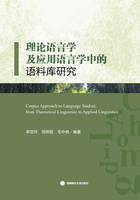
References
BECHER T,1981. Towards a definition of disciplinary cultures[J]. Studies in higher education,6(2):109-122.
BECHER T,1987. Disciplinary discourse[J]. Studies in higher education,12(3):261-274.
BECHER T,1994. The significance of disciplinary differences[J]. Studies in higher education,19(2):151-161.
BECHER T, TROWLER P,2001. Academic tribes and territories[M]. Buckingham:Open University Press.
BIBER D, BARBIERI F,2007. Lexical bundles in university spoken and written registers [J]. English for specific purposes,26(3):263-286.
BIBER D, CONRAD S, CORTES V,2004. If you look at...:Lexical bundles in university teaching and textbooks[J]. Applied linguistics,25(3):371-405.
BONDI M,2010. Metadiscursive practices in introductions:Phraseology and semantic sequences across genres[J]. Nordic journal of English studies,9(2):99-123.
BONDI M,2015. Probably most important of all:Importance markers in academic and popular history articles[M]//GROOM N, CHARLES M, JOHN S. Corpora, grammar and discourse:In honour of Susan Hunston. Amsterdam:John Benjamins:161-182.
BONDI M,2017. What came to be called:Evaluative what and authorial voice in the discourse of history[J]. Text & talk,37(1):23-48.
BONDI M, DIANI G,2015. I am wild about cabbage:Evaluative ‘semantic sequences' and cross-linguistic (dis)similarities[J]. Nordic journal of English studies,14(1):116-151.
CHARLES M,2006a. The construction of stance in reporting clauses:A cross-disciplinary study of theses[J]. Applied linguistics,27(3):492-518.
CHARLES M,2006b. Phraseological patterns in reporting clauses used in citation:A corpus-based study of theses in two disciplines[J]. English for specific purposes,25:310-331.
CHARLES M,2007. Argument or evidence? Disciplinary variation in the use of the noun that pattern in stance construction[J]. English for specific purposes,26:203-218.
CORTES V,2004. Lexical bundles in published and student disciplinary writing:Examples from history and biology[J]. English for specific purposes,23(4):397-423.
DURRANT P,2017. Lexical bundles and disciplinary variation in university students'writing:Mapping the territories[J]. Applied linguistics,38(2):165-193.
ELLIS N C,1997. Vocabulary acquisition:word structure, collocation, word-class, and meaning[M]//SCHMITT N, MCCARTHY M, Eds. Vocabulary:description, acquisition and pedagogy. Cambridge:Cambridge University Press:122-139.
FRANCIS G, HUNSTON S, MANNING E,1996. Collins cobuild grammar patterns 1:Verbs[M]. London:HarperCollins Publisher.
GLEDHILL C,2000. Collocations in science writing[M]. Tübingen:Gunter Narr Verlag.
GRAY B,2015. Linguistic variation in research articles[M]. Amsterdam:John Benjamins.
GRAY B, CORTES V,2010. Perception vs. evidence:An analysis of this and these in academic prose[J]. English for specific purposes,30(1):31-43.
GROOM N,2005. Patterns and meanings across genres and disciplines:An exploratory study[J]. Journal of English for academic purposes,4:257-277.
GROOM N,2007. Phraseology and epistemology in humanities writing[D]. Birmingham:University of Birmingham.
GROOM N,2009. Phraseology and epistemology in academic book reviews:A corpus-driven analysis of two humanities disciplines[M]//HYLAND K, DIANI G, Eds. Academic evaluation:Reviews genres in university settings. London:Palgrave Macmillan:122-139.
GROOM N,2010. Closed-class keywords and corpus-driven discourse analysis[M]//BONDI M, SCOTT M, Eds. Keyness in texts. Amsterdam:John Benjamins:59-78.
HALLIDAY M A K, MATTHIESSEN C M I M,2004. An introduction to functional grammar[M]. 3rd ed. London:Arnold.
HANKS P,2013. Lexical analysis[M]. London:The MIT Press.
HOEY M,2005. Lexical priming:A new theory of words and language[M]. London:Routledge.
HUNSTON S,2008. Starting with the small words:Patterns, lexis and semantic sequences [J]. International Journal of Corpus Linguistics,13(3):271-295.
HUNSTONS,2011. Corpus approaches to evaluation:Phraseology and evaluative language [M]. London:Routledge.
HUNSTON S, FRANCIS G,2000. Pattern grammar:A corpus-driven approach to the lexical grammar of English[M]. Amsterdam:John Benjamins.
HYLAND K,2008. As can be seen:Lexical bundles and disciplinary variation[J]. English for specific purposes,27(1):4-21.
IVANIC R, LEA M,2006. New contexts, new challenges:the teaching of writing in UK higher education[M]//GANOBCSIL-WILLIAMS L, Eds. Teaching academic writing in UK higher education. Basingstoke:Palgrave Macmillan:6-15.
JIANG F,2007. Stance and voice in academic writing:The“noun+that”construction and disciplinary variation[J]. International journal of corpus linguistics,22(1):85-106.
KARIMI M N,2014. Disciplinary variations in English domain-specific personal epistemology:Insights from disciplines differing along Biglan's dimensions of academic domains classification[J]. System,44:89-100.
KILGARRIFF A, RYCHLY P, SMRZ P, et al. The sketch engine. Proceedings of the 11th EURALEX International Congress, July 6-10,2004[C]. France:Lorient,2008.
MCGRATH L,2016. Self-mentions in anthropology and history research articles:Variation between and within disciplines[J]. Journal of English for academic purposes,21:86-98.
MITCHELL S, EVISON A,2006. Exploiting the potential of writing for educational change at Queen Mary, University of London[M]//GANOBCSIL-WILLIAMS L, Eds. Teaching academic writing in UK higher education. Basingstoke:Palgrave Macmillan:68-84.
NATTINGER J R, DECARRICO J S,1992. Lexical phrases and language teaching[M]. Oxford:Oxford University Press.
RÖMER U,2011. Corpus research applications in second language teaching[J]. Annual review of applied linguistics,31:205-225.
SCHMITT N,2004. Formulaic sequences[M]. Amsterdam:John Benjamins.
SINCLAIR J,1991. Corpus, concordance, collocation[M]. Oxford:Oxford University Press.
SINCLAIR J,2004. Trust the text:Language, corpus and discourse[M]. London:Routledge.
THOMPSON G, YE Y,1991. Evaluation in the reporting verbs used in academic papers [J]. Applied linguistics,12(4):365-82.
TROWLER P,2014. Depicting and researching disciplines:Strong and moderate essentialist approaches[J]. Studies in higher education,39(10):1720-1731.
WITTGENSTEIN L,1953. Philosophical investigations[M]. London:Blackwell Publishing.
WRAY A,2000. Formulaic sequences in second language teaching:Principle and practice [J]. Applied linguistics,21(4):463-489.
WRAY A,2002. Formulaic language and the lexicon[M]. Cambridge:Cambridge University Press.
WRAY, A. Formulaic language:Pushing the boundaries[M]. Oxford:Oxford University Press.